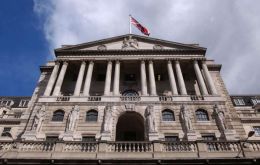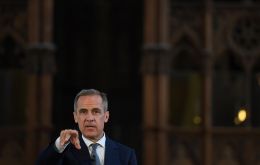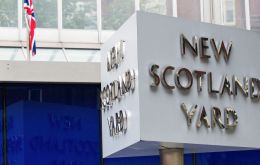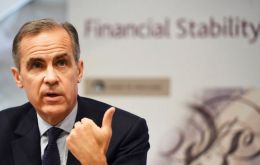MercoPress. South Atlantic News Agency
Tag: Bank of England
-
Thursday, March 22nd 2018 - 22:22 UTC
Bank of England leaves rates unchanged for now, waiting for more Brexit data

The Bank of England signaled on Thursday that it remains on course to lift interest rates in Britain this year and next, as figures showed a yearlong squeeze on consumers caused by a steep fall in the pound appears to be coming to an end.
-
Friday, February 9th 2018 - 10:45 UTC
Bank of England expects pace of interest rate increases to accelerate

The Bank of England has indicated that the pace of interest rate increases could accelerate if the economy remains on its current track. Bank policymakers voted unanimously to keep interest rates on hold at 0.5% at their latest meeting. However, they said rates would need to rise “earlier” and by a “somewhat greater extent” than they thought at their last review in November. Economists think the next rate rise could come as soon as May.
-
Wednesday, January 31st 2018 - 08:55 UTC
UK economy expands 0.5% in fourth quarter and 1.8% for the whole of 2017

The UK economy expanded at a slightly faster pace in the fourth quarter on services and manufacturing output, but the full-year growth was the weakest in five years, preliminary data from the Office for National Statistics showed. GDP grew 0.5% sequentially in the fourth quarter, while the rate was forecast to remain unchanged at 0.4%.
-
Saturday, January 27th 2018 - 09:31 UTC
Bank of England said UK was already suffering a “Brexit effect”

A “deeper relationship” with Europe will benefit the UK economy, the governor of the Bank of England has argued. Mark Carney's comments follow claims by chancellor Philip Hammond that the UK and EU economies will only move “very modestly” apart after Brexit.
-
Tuesday, December 5th 2017 - 14:06 UTC
Bitcoin and other virtual currencies on Scotland Yard radar because of money laundering

The anti-money laundering regulations should be updated to include Bitcoin and other virtual currencies, the UK Treasury has said. The Metropolitan Police says criminals are using crypto-currency cash machines to launder money in London.
-
Thursday, November 30th 2017 - 15:40 UTC
More pliant rules for the banking and insurance industry in post-Brexit, says Bank of England

Britain’s regulators will convert banking and insurance rules inherited from the European Union after Brexit to make them more tailored to the British market, Bank of England Governor Mark Carney said on Wednesday. Carney said Britain had long expressed opposition to the EU’s cap on banker bonuses, the full application of banking capital rules on smaller lenders and the bloc’s insurance capital rules.
-
Tuesday, November 21st 2017 - 13:16 UTC
ECB warns banks that they “need to have substance locally” in post Brexit

European regulators have warned banks working on post-Brexit plans that they will “need to have substance locally” to serve European clients. The European Central Bank said some of the proposals it has reviewed are inadequate and risk creating “empty shells”.
-
Friday, November 3rd 2017 - 07:37 UTC
Bank of England's first interest rate increase in a decade; Brexit impact hovers over future decisions

The Bank of England has raised interest rates for the first time in a decade to contain an increase in inflation stoked by the Brexit vote, in what is otherwise a moment of high uncertainty for the economy. In a statement Thursday, the bank said it had lifted its benchmark rate, which affects the cost of loans and savings rates in the wider economy, to 0.50% from the record low of 0.25%.
-
Tuesday, October 31st 2017 - 07:58 UTC
Uncertainty and inflation expected to make Bank of England reverse monetary policy

Bank of England is expected to reverse emergency action taken following the Brexit referendum, when it cut rates from 0.5% to 0.25% to avert a recession. While a slump has not materialized, the British economy appears in worse health than most other major countries, with potential to be blown further off course by faltering talks to leave the EU.
-
Wednesday, October 18th 2017 - 11:56 UTC
UK inflation climbs to 3% in September, mainly because of the fall in sterling

The UK's key inflation rate hit its highest for more than five years in September, driven up by increases in transport and food prices. The Consumer Prices Index (CPI) climbed to 3%, a level it last reached in April 2012, and up from 2.9% in August. The pick-up in inflation raises the likelihood of an increase in interest rates - currently 0.25% - next month.
